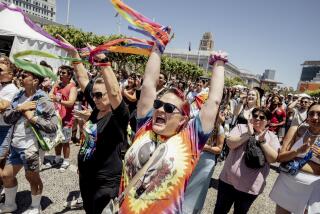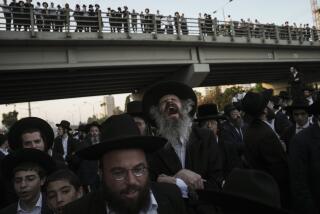Gay Pride Parade Is Latest Battle in Israel’s Culture War
TEL AVIV — Celebrating gay pride, thousands of Israelis in tank tops and shorts danced to deafening music and waved rainbow-colored flags Friday.
The annual street party has become the latest venue in the culture war between secular Israelis and devout Jews who consider homosexuality an abomination.
“We promise to support your struggle against the religious,” legislator Tommy Lapid, leader of the secular rights party Shinui, told the cheering crowd.
In recent years, gays and lesbians in Israel have scored a string of successes in the courts, though not in parliament, where ultra-Orthodox religious parties have considerable clout.
Last month, the Supreme Court allowed a lesbian spouse to be registered as the second parent of her partner’s biological son. In 1994, same-sex unions were recognized for benefit purposes.
The court rulings have coincided with growing public acceptance of gays. Just a few years ago, public displays of gay pride were unheard of in Israel. By contrast, gays were hugging and kissing in Tel Aviv’s central Rabin Square in 1998 to celebrate the transsexual singer Dana International’s victory in the Eurovision Song Contest.
During the last few years, the gay pride parade has drawn an increasing number of people.
On Friday, Rabin Square was lined with Israeli flags and the rainbow banners of the gay pride movement. Techno music blared from loudspeakers on trucks.
Some in the parade wore elaborate costumes, while others wore shorts and T-shirts. Parents brought children, and some heterosexual couples walked hand in hand.
There were no religious protests. Tel Aviv is an overwhelmingly secular city, and the parade was being held just before the onset of the Jewish Sabbath, during which observant Jews refrain from work and travel.
Taking a break from the blazing heat, Kinneret Golan said the scene made her feel that Israel was no different from other countries.
“You only see pictures of Israel when rocks are being thrown. I’m proud that, despite everything, we can still do this,” she said.
Golan said that in the increasingly bitter culture war between Israel’s secular majority and the devout minority, the distrust is so great that “each side defines itself as the opposite of what the other is.”
Therefore, she said, many secular Israelis will support causes as long as they are denounced by the religious community.
Lapid, standard-bearer of the secular fight against what he calls religious coercion, said his party and the homosexual movement are natural partners.
More to Read
Sign up for Essential California
The most important California stories and recommendations in your inbox every morning.
You may occasionally receive promotional content from the Los Angeles Times.










